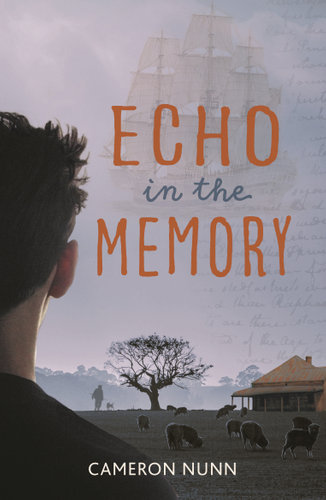Cameron Nunn, Echo in the Memory, Walker Books Australia, June 2021, 272 pp., RRP $19.99 (pbk), ISBN 9781760653088
Will is sent away to stay with his grandparents after his mother attempts suicide. They live on a remote farm and Will is not happy to go but needs to support his little sister, Rosie. When they are there, he finds he has some odd feelings of déjà vu, as though he has been at the property sometime in the past. He tries to discuss these feelings with his grandparents and their neighbour but the feelings are dismissed. It is eventually his rather grumpy grandfather, after whom Will is named, who acknowledges the feelings, confesses to having the same and shows Will an old clay tobacco pipe that has links to the past.
This is not the whole plot, however, as we also have the story of an unnamed convict boy (we do learn his name at the very end of the book). Will’s story and that of the convict boy have a number of parallels. The convict boy, after being transported to New South Wales, is sent to a remote farm – part of which later belongs to Will’s grandfather. Both boys feel abandoned and this comes, at least in part, because of their relationship with their mothers. The convict boy’s mother does not protect him from the Fagin-like figure of her partner and seems unmoved when he is sentenced to transportation. Similarly, Will feels his mother doesn’t really want him or Rosie or she would not want to leave them. Both boys are grieving – for loss of place, for loss of their old lives and for the important people in their lives. The convict boy very much wants to better himself and is helped by the daughter of the foreman on the farm to learn to read but tragically, his future does not turn out the way he wants as he is targeted by another convict who fails to protect the boy from one of the perils of the Australian bush.
The convict boy’s part of the story is told in the first-person which gives it an immediacy for the reader. We share his thoughts and feelings and are privy to the conversations he has with other convicts, especially Irish-born Cain, who initially befriends him. The two have a falling out, however, when the boy finds a cave with cave paintings, making him realise that the so-called ‘savages’ he’s been told about, are people just like him. Cain refuses to believe this and refuses too, to acknowledge that First Nation’s struggles to retain their land and protect it from invaders is the same as his own struggles to protect Irish land from the English. Attitudes to First Nations people by early white settlers are starkly portrayed in the story.
After the death of his grandfather whose body is found at a spot that has significance in both past and present and his further estrangement from his father, Will decided to stay on the farm thus, in a sense, bringing the story full circle.
This is a book aimed at middle secondary students. Teachers’ notes are available, based on the Australian Curriculum. At the end of the book are questions designed to stimulate discussion about the book and a number of the issues it raises.
Reviewed by Margot Hillel


